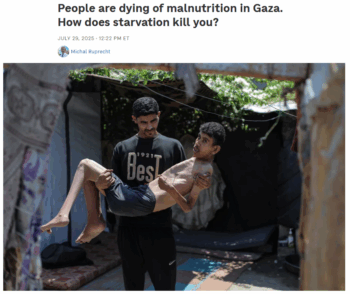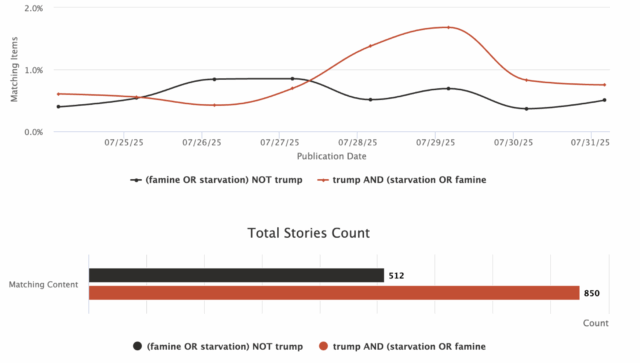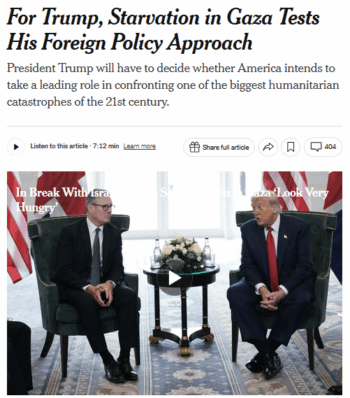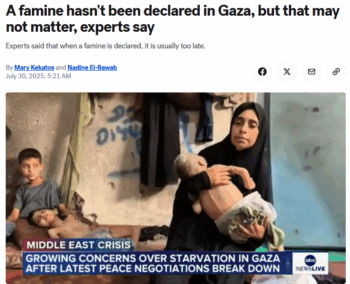International human rights organizations have pleaded with governments to oppose Israel’s blockade of aid into Gaza for the better part of the past year. But it wasn’t until late July, when dramatic images of emaciated children circulated widely, that corporate media and establishment politicians finally took notice. After 21 months of relentless bombing and even more decades of occupation, the news cycle gave extended attention to Palestinian starvation (FAIR.org, 7/29/25).
Quantity, however, does not always equal quality. To see if the content of reporting on the engineered Gaza famine matches the seriousness of the situation, FAIR surveyed coverage from nine different news outlets (New York Times, ABC, NBC, CNN, PBS, BBC, NPR, Time and Politico) during the week after the initial proliferation of reportage (7/24–31/25) to assess how or whether they discussed the full scope of the crisis.
Apart from the acute, potentially fatal consequences of starvation, malnutrition comes with permanent, long-term side effects that could affect the population for generations. Though increased coverage pushed the immediate issue into the limelight, we found that media did not consistently report on the stakes and long-lasting impacts of starvation on Palestinians’ health.
The New York Times’ infamous addition of an “editor’s note,” explaining that a Gazan child depicted in a report as facing starvation should be re-interpreted as suffering from “pre-existing” conditions, highlighted the need for honest journalistic assessments of starvation’s impacts, as well as its causes.
‘Medical consequences’

NPR‘s article (7/29/25) provides detailed information on the effects of starvation—but the headline avoids saying who’s causing it.
NPR published two articles on July 29 that broke down the physiological process of starvation. In an article (7/29/25) headlined “People Are Dying of Malnutrition in Gaza. How Does Starvation Kill You?,” it elaborated on the “five phases of starvation,” where depletion of carbohydrates and fats leaves one first feeling fatigue before experiencing weakened organs and cardiac arrest. If one is pregnant, then starvation could result in “preterm birth, stunting, impaired immune function” and, for the babies, “long-term risks for noncommunicable diseases like diabetes.”
In another article, headlined “As Gaza Starves, the Next Generation May Also Endure the Consequences,” NPR (7/29/25) cited credible research that saw how children born to those pregnant during a famine were “more likely to experience obesity, diabetes, cardiovascular disease and shorter lifespans.” The trauma of starvation is even remembered on a molecular basis, affecting “how genes are turned on or off,” where “those epigenetic changes can be passed down to descendants.”
Further, Time (7/30/25) platformed experts who warn that malnourishment and missed meals for pregnant people increase “the likelihood of miscarriage, stillbirth and undernourished newborns.” “Reduced IQ, learning disabilities and behavioral problems that persist through life,” along with compromised immune systems, are among other pressing health concerns for children consistently denied proper nutrition.
In discussing “The Medical Consequences of Starvation,” Time (7/31/25) not only touched upon lifelong mental health struggles for children like “anxiety, depression, post-traumatic stress disorder and mental illnesses like schizophrenia,” but also the immediate threat of “refeeding syndrome.” Bodies that have adapted to an altered diet must slowly be reintroduced to normal food intake in an intensely monitored environment, lest they trigger “cardiac arrhythmia, organ dysfunction and death.”
Despite serious efforts in these articles to highlight how starvation will affect the Palestinian population beyond this “war,” none of them named Israel as the perpetrator in their headlines.
Israel not held accountable
This was a pattern in coverage: Even when outlets adequately addressed the dire consequences of food deprivation, reporting still fell short of holding Israel responsible for deliberately inducing starvation. Rarely if ever did these media label Israel’s food blockade as a tool of genocide.
Though one of the aforementioned NPR articles (7/29/25) attributed “what the UN is calling ‘catastrophic hunger’” to “Israel’s blockade and military offensive,” the outlet refused to explicitly call out the intentionality behind such a blockade. Instead, the article identified “conflict” as one of the root causes of prolonged starvation in Gaza.
While other articles (e.g., NPR, 7/29/25) cited a collapsing ceasefire deal with Hamas as the reason for Israel’s total blockade of aid into Gaza, Time (7/31/25) did not bother with such justification. The article simply stated that “Israel reimposed a blockade on the Gaza Strip, preventing the entry of food, fuel, medicine and other humanitarian aid.” By restricting discussion of Israel’s responsibility in manufacturing famine to a single sentence, the magazine encourages complacency, an acceptance of the blockade and subsequent crisis as a natural consequence of a “conflict.”
Seeking Trump’s ‘moral leadership’

Discussions of “starvation” and “famine” became significantly more newsworthy when Trump was involved.
Headlines on July 28 largely focused on President Donald Trump’s acknowledgement of the crisis, dedicating equal, if not more, attention and platform to a figure who has himself threatened the people of Gaza with genocide than to those decrying the disaster.
Many outlets (NPR, 7/28/25; NBC, 7/28/25; Politico, 7/28/25; CNN, 7/28/25; BBC, 7/28/25; PBS, 7/28/25) reported how Trump saw what he called “real starvation” in Gaza, and how he’s breaking with Israeli Prime Minister Benjamin Netanyahu on this front, who vehemently denies evidence of starvation and blames any malnutrition on Hamas. These articles, however, did not go beyond reporting the current available number of hunger-related deaths to illuminate the long-term, possibly permanent, bodily damage caused by starvation, and why it’s considered genocidal.

The New York Times (7/28/25) suggested that the Gaza famine, engineered with the active participation of the US government, would be a test of Trump’s “moral leadership.”
The New York Times (7/28/25) went further to claim that “For Trump, Starvation in Gaza Tests His Foreign Policy Approach,” putting a frame of political strategy on an urgent humanitarian crisis:
Global crises, especially those unfolding far from the United States, have often been tests of whether American presidents would show moral leadership on the world stage…. Now, it is Mr. Trump’s turn to address the question of whether America still intends to take a leading role among nations in confronting the humanitarian effects of war.
By casting US intervention as an opportunity to signal “moral leadership,” the Times attempted to obscure our direct participation in arming a genocide and financing famine. It is like asking whether someone is going to be a hero for saving the residents of a burning building they helped set fire to–without mentioning the arson.
The Times (7/31/25) also decentered Palestinians in another piece headlined “Anger Over Starvation Leaves Israel Incredibly Isolated.” This article brought in several political analysts to assess Israel’s standing with the global public, showing more concern for Israel’s abstract economic health than Palestinians’ physical health: “As anger grows over widespread hunger in Gaza, Israel risks becoming an international outcast.” The piece continued:
“What’s happening in Gaza is appalling,” and it diminishes the willingness of people to travel to Israel and to work with its scientists and companies, [Bernard Avishai, an Israeli American professor and analyst,] said. “For the Israeli economy,” he noted, “this is already devastating.”
While the Times gathered five analysts to discuss Israel’s economy and international image, the only source to amplify the plight of Palestinians was the generic collective “aid groups,” who were said to have documented “mounting malnutrition and cases of starvation.” Further, even though one of the quoted analysts mentioned “genocide,” it was not to illuminate how Israel’s actions constitute crimes against humanity. Instead, it was in reference to how the increasing use of the characterization was emblematic of Israel’s dwindling influence on public opinion.
And as noted, even when the New York Times (7/24/25) dedicated an article to actually covering the crisis, the outlet felt the need to apologize for it. Under the outrageously passive headline, “Gazans Are Dying of Starvation,” the Times featured heartbreaking personal stories from doctors constrained by limited resources, and parents helplessly watching their children waste away. It noted how “doctors warn that malnutrition in early childhood can have long-term effects, disrupting growth, cognitive ability and emotional development.”
However, the Times issued an editor’s note five days after its initial publication, “clarifying” that one of the children featured in the reporting as “suffering from severe malnutrition” has “pre-existing health problems.” The paper of record seemed to expect readers to temper their outrage with this new information, as if manufactured famine does not exacerbate poor health.
‘Famine determination may not matter’

The word “Israel” appears only once in this ABC News article (7/30/25) , in the ninth paragraph, when an Oxfam official is cited saying that “much more food needs to enter Gaza than is currently being let in because of severe restrictions put in place by Israel.”
The media are also creating unnecessary debate around the classification of “famine.” ABC (7/30/25) platformed humanitarian workers and food security experts who expressed how “a famine determination may not matter because the time to intervene is now. Assessing famine often comes after many lives are lost.” And yet the news outlet didn’t heed their own advice, immediately following this with a section asking, “What is the criteria for how a famine is determined?”
NBC (7/29/25) similarly discussed “How Famine Is Assessed.” This was the concluding section of an article that was brimming with several alarming statistics from humanitarian organizations about rising death tolls and hospital admissions, due to starvation and malnutrition alone. To focus on the technicalities of classification rather than elucidate the realities of prolonged starvation reveals how media still fail to prioritize Palestinian lives.
The effects of starvation are neither obscure, unknown, nor drastically varied. They are quite universally applicable to any given human body. However, media seem confused as to whether they consider Palestinians human enough to afford such attention.
Starvation and famine are not mere moments in time, as per establishment media’s characterization. They are disastrous phenomena and traumas that a population carries long beyond the immediate crisis. They are not easily fixed by simply allowing in aid or reintroducing food to the body. And yet corporate media rarely admit the true scale of what has been destroyed and what that destruction signifies, let alone imagine what true repair would require. Substandard coverage distorts and conceals the gravity of the crisis.
This content originally appeared on FAIR and was authored by Shirlynn Chan.